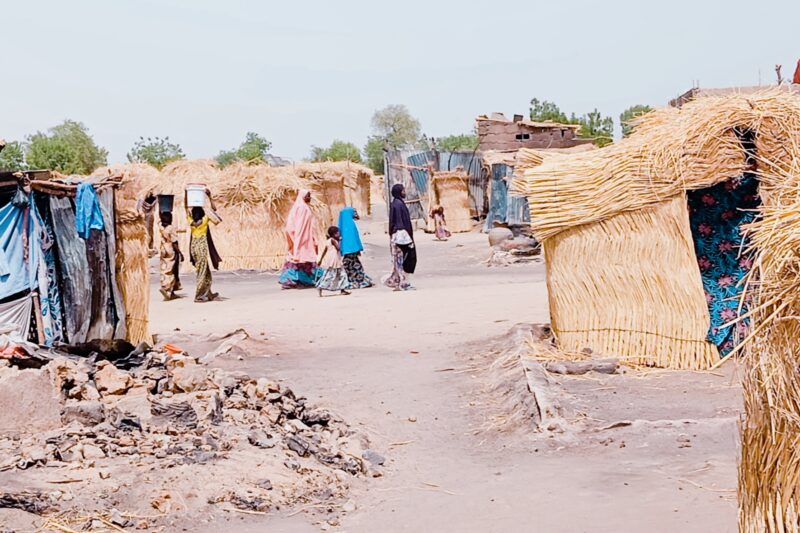Despite the immunisation drive, healthcare workers say measles outbreaks across Borno State are showing no sign of abating and more children are at risk of dying every day.
Despite an extensive door-to-door immunisation programme across Nigeria’s northeastern Borno State, hundreds of children have fallen ill with measles and, in the past month alone, at least 10 kids in the Dikwa Local Government Area have died from the contagious disease.
It is the vulnerable children of internally displaced persons (IDPs) living in unofficial community camps who are most at risk.
Officials from Médecins Sans Frontières (MSF) – also known as Doctors Without Borders – said in February that they had treated 800 measles cases this year, adding that outbreaks in the state were showing no signs of abating.
MSF treated 3,965 patients between October and December last year.
The international medical organisation said the inability of healthcare workers in Nigeria to achieve the 95% vaccination rate required to suppress measles had led to an alarming rise in the number of people affected by the virus last year.
The virus spreads quickly among unvaccinated children. One infected child can spread the virus to between nine and 12 other unvaccinated children.
Measles is a highly contagious, airborne virus that can affect anyone but it is most common in children under the age of five.
It infects the respiratory tract and then spreads throughout the body.
It spreads easily when an infected person breathes, coughs or sneezes. It can cause severe disease, complications and even death.
Measles can be prevented by two doses of vaccine. Symptoms include high fever, cough and runny nose. It causes rashes and bumps all over a patient’s body.
Ali Gambo, an official at the Borno State Primary Healthcare Development Agency, confirmed that there had been outbreaks of measles across the state, adding that all the necessary measures had been put in place to prevent further outbreaks.
“We are working with heathcare practitioners, as well as all relevant agencies and institutions, to curtail measles outbreaks. The focus is primarily on schools and IDP camps.
“Our immunisation team is going from house to house across the state to vaccinate children against measles and other diseases.
“But one of the greatest challenges we face is that many people in the rural areas do not trust modern medicine. Most do not have easy access to doctors and hospitals or clinics.
“Parents are extremely wary of allowing their children to be vaccinated. They do not trust the ‘strangers’ who appear on their doorsteps asking for permission to immunise their kids. Most rely on traditional herbs and remedies, which generally do not work. Many people, particularly children, die because of ignorance.
“There needs to be many more awareness programmes to explain the efficacy of immunisation and to encourage parents to ensure their children are vaccinated.”
Hajja Ya Kura, a nurse at the Dikwa Specialist Hospital, told RNI that there had been an escalation in the number of measles, chicken pox and meningitis cases.
In the past month we recorded more than 50 cases of measles. At least 10 children died.”
Ya Halima Modu, a displaced woman who lives in the Masarmari camp in Dikwa, said: “Many children in the camp have died from measles. We try to take care of our kids but we don’t have a health facility where children can receive proper treatment.
“When children develop symptoms, such as body rashes, high fever, coughing and reddish eyes, we try to treat them using traditional herbs and remedies but they do not respond well.”
A measles outbreak in the sprawling Muna IDP camp in Maiduguri, the capital of Borno State, has caused great concern among residents.
Ya Kaltum Mustapha said there were many children in the camp who had measles.
“When we see the rashes developing, we know our children have measles. High fever and headaches follow.
“But it’s not just measles. There are kids who are suffering from meningitis and chickenpox, too,” she said. “Mostly we treat the children using traditional herbal remedies because there is no health facility in the camp.
“But the children do not respond well and each day more children are getting ill. So far, we have been lucky. No child has died.”
Abatcha Musa, the chairman of the camp, confirmed the outbreak.
“It is of great concern because most of the children have not been vaccinated so the illness is easily spread.
“We do not have an adequate medical facility in the camp and most parents cannot afford to take their children to healthcare centres outside the camp.
“Mothers resort to traditional medicine. But old-time remedies are not working and more children are getting sick.
“Residents claim that there has been an outbreak of meningitis but at this time we are unable to confirm this.”
Abatcha said it was imperative that health officials in the Borno State government step up the immunisation drive to prevent more children from getting ill.
“Thankfully, there have been no deaths in the camp. But that could change as more children are falling ill every day.”
The World Health Organisation (WHO) said: “No country is exempt from measles and areas with low immunisation encourage the virus to circulate, increasing the likelihood of outbreaks and putting all unvaccinated children at risk.”
Most deaths from measles were from complications related to the disease, including blindness, encephalitis (brain swelling), ear infections and severe breathing problems.
If women caught measles during pregnancy, it was dangerous for the mother and could result in her baby being born prematurely with a low birth weight.
Complications were most common in children under five years and adults over the age of 30.
Measles weakened the immune system and could make the body “forget” how to protect itself against infections, leaving children extremely vulnerable, the WHO said.
SHETTIMA LAWAN MONGUNO









